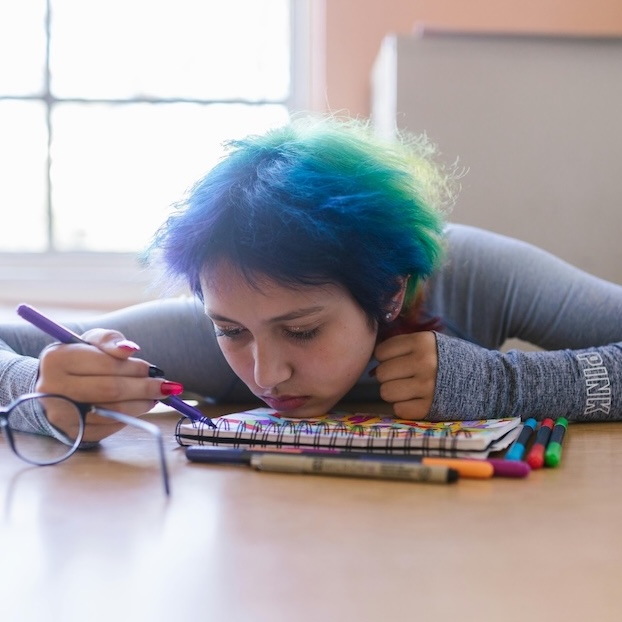Recognizing that your child or teen may benefit from speaking with a therapist is an important step toward supporting their emotional well-being. Whether they’re feeling overwhelmed by school stress, navigating challenges in relationships, struggling to stay focused in class, or dealing with other emotional hurdles, therapy can help your child build confidence, develop healthy coping strategies, and learn to manage big emotions.
Discussing therapy with your child can feel overwhelming, but it’s crucial to make sure they’re on board and ready to speak to someone new about what they’re going through. Whether your child is in elementary, middle, or high school, tailoring the conversation to their age and development is key.
In this guide, find general recommendations for starting the conversation, followed by age-specific advice to help you talk to your child about therapy.
Request Therapy for Your Child ➡️
General tips for talking about therapy
1. Normalize therapy: Explain that therapy is common and helpful, like going to the doctor for the flu, or getting extra help from a teacher or coach. If you’ve ever sought out therapy yourself, share your experience.
2. Focus on benefits: Frame therapy as a supportive resource, that will help your child or teen with what they’re struggling with. It's a confidential and private space where they can share their thoughts and feelings.
3. Pick the right moment: Choose a calm and private time to chat. A quiet moment, like a car ride, bedtime, meal, or shared activity might work well.
4. Acknowledge their feelings: Your child might be resistant, nervous, or confused. Let them know it’s ok to feel that way, and that you’re here to support them through the process. Remind them that the therapist they will be speaking to is an expert in helping kids!
Looking for further conversation ideas to use with your child or teen?
Download our Conversation Starters for prompts tailored to each age group, to help you talk to your child about various topics, including their mental health.
Talking about therapy with your elementary schooler
Your elementary schooler may not fully understand the concept of therapy, so it’s important to keep the conversation clear and encouraging.
1. Keep it simple and positive: Use language that is easy for your child to understand, like, “sometimes, we talk to someone who can help us feel better when we’re sad or worried.”
2. Create a sense of safety: Reassure your child that therapy is safe and even fun! It’s a space where they can share their feelings. Your child might even get to play and do art with their therapist.
3. Answer their questions gently and be patient: Your child may not fully understand therapy, they may ask–”why do I need to talk to someone?” Keep your response encouraging, and reassure them that sometimes we all need a little extra help to feel better!
Talking about therapy with your middle schooler
Middle schoolers are at a stage where they’re becoming more self-aware and may feel hesitant or uncertain about therapy.
1. Start with observations: Calmly share with your child what you’ve noticed–”I’ve noticed you’ve been feeling more stressed or upset lately.” Reassure them that therapy is a tool that will help them feel better.
2. Address concerns: Your child might be hesitant about meeting and speaking to someone new. If they’re hesitant, acknowledge these feelings–”trying something new can feel weird or scary, but let’s give it a chance and see how it goes.”
3. Normalize the experience: Explain that a lot of middle schoolers (and people of all ages) benefit from therapy–your child is not alone.
Talking about therapy with your high schooler
High schoolers often appreciate directness and independence. They may view therapy with skepticism or concern, and likely already have an opinion on the topic. As you talk to your teen about therapy, it’s important to respect their autonomy.
1. Emphasize independence: Frame therapy as a tool to support their goals and well-being, not as a punishment for something they did. Reassure them that what they discuss in therapy is private and confidential, and will not be shared outside of the space.
2. Be direct and empathetic: Your teen likely values honesty, and they likely know people who have pursued therapy. Have an open conversation with your teen about why you think they could benefit from therapy, and provide the opportunity for them to share their perspective.
3. Follow up respectfully: After their first session, check in without being nosy. Ask how the session went and whether it was what they expected.
Talking to your child about therapy is an important step in supporting their emotional well-being. By tailoring the conversation to their age, normalizing the process, and focusing on the benefits, your child will feel positive and empowered as they begin the therapy process. With your support, your child can build the skills they need to succeed in school, at home, and beyond.



.jpeg)

